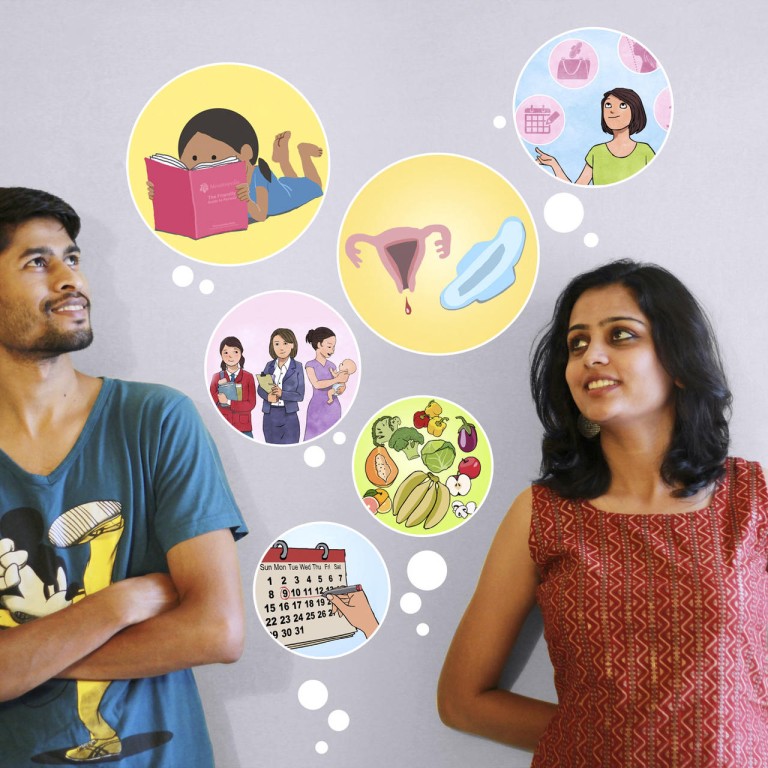
How an Indian woman tackled the taboo subject of menstruation
Asia's conservative attitude towards reproductive health is causing unnecessary shame and suffering, but an Indian woman is making a stand, writes Amrit Dhillon
Aditi Gupta is an upper middle class, educated young woman with a degree in design from a top Indian design institute. So why did she treat her body as impure, avoiding the kitchen for fear of contaminating food, washing her clothes separately and not touching pickles or poppadoms because they would go bad whenever she had her period?
The reason: shame. Menstruation is a taboo subject whether you are an illiterate village woman or an urban sophisticate with an MBA. Gupta, 29, was steeped in the superstitions and myths that surround menstruation in India, despite her education.
"It was only after I got married and used to have pain and cramps that my husband began researching on the net how to help me. I realised I didn't really understand my own body. There is so much information out there but Indian women don't have it," says Gupta.
There is so much information out there but Indian women don't have it
This prompted her to create a new comic book and website called Menstrupedia to shatter the taboo surrounding the subject in conservative Indian society, where ironically internet pornography is easily available and sex columns in newspapers discuss masturbation and premature ejaculation but not menstruation.
The silence around menstruation makes young Indian girls feel ashamed, which is then exacerbated by parents and teachers avoiding the subject. Menstrupedia aims to break the silence so that girls feel more relaxed about their bodies and are more aware of the hygiene practices that they should follow.
Although sex education is taught in some schools, Gupta found that the timing was all wrong.
"When I was at school, the chapter on reproduction came up in class nine, but my periods had begun in class seven. In any case, the exam paper had no question on menstruation, so no one paid any attention to it," she says. "Nothing has changed." Unaware, frightened and ashamed, girls would hide their periods from their families.
During a workshop held in a rural school, Gupta came across a village girl who, resorting to incredible ingenuity, managed to hide her "sordid" secret from her parents for a whole year.

Traditionally, menstruating women are not allowed to go into temples or touch certain foods because their touch is deemed to be contaminating.
All these myths are tackled in Menstrupedia's 90-page comic book and on the website. Well-designed, colourful and easy to follow, the comic conveys information about puberty, the physiology behind menstruation and debunks a number of myths.
It is meant not just for young girls but boys, parents, teachers and NGOs working in the field of sex education.
In fact, Gupta says that many of Menstrupedia's online readers are based outside India, often in other equally conservative Asian societies.
Chinese culture has some similar beliefs according to Wendy Wong, a lecturer with the division of nursing and health studies at the Open University of Hong Kong.
In a study Wong conducted, she found that male students in Hong Kong regarded menstruation as a secret topic. One reason, she surmised, could be that in primary and lower secondary schools, boys and girls receive sex education separately and so learn only about their own reproductive systems.
"Given that boys do not receive formal discussion on the reproductive health of females during sex education in schools, female reproductive health, including menstruation, is an unknown topic to them," she says.
The challenge for Gupta was to make Menstrupedia culture-specific and deal with the reticence often found in Asian cultures. Although Western material on this topic was easily available in India, it was not suited to Indian readers, and hence not used by even those schools that wanted to teach boys and girls about menstruation.
"Indians are uncomfortable with anything too explicit. Western books can be seen as shameful with too many pictures of naked people and sex organs and too many explicit words. I had to make a comic book that a girl can look at while sitting with her parents around and still feel comfortable," she says.
The website gets around 200,000 hits every month and Gupta has distributed about 500 comics, including among nuns in Buddhist monasteries in India.
The response, she says, has been tremendous with schoolgirls gaining in confidence after seeing menstruation portrayed positively. Her plan is to work with schools and NGOs to make the comic books widely available.
At present available only in English, the comic book and website will be translated into several other Indian languages and will be customised to suit the different cultures in various states.
The consequences of the shame and silence around menstruation can be wider than might be imagined. Gupta says that girls often drop out of school when their periods begin simply because bins are not provided for disposal of their sanitary towels.
The affluent and educated in the cities are not much better informed. Gupta laughs when she recalls how her husband, who has no sisters, knew hardly anything about a woman's periods before marrying her. He was mortified to realise that Gupta, who suffers from cramps, had to endure intense discomfort every month.
Even though Gupta is aware of the nonsensical beliefs surrounding menstruation, she is still taken aback sometimes. At a recent workshop for affluent women, a beautifully groomed and coiffed businessman's wife announced: "Never touch basil when you have your period. The herb shrivels up immediately."
"I didn't know whether to laugh or cry," says Gupta.

